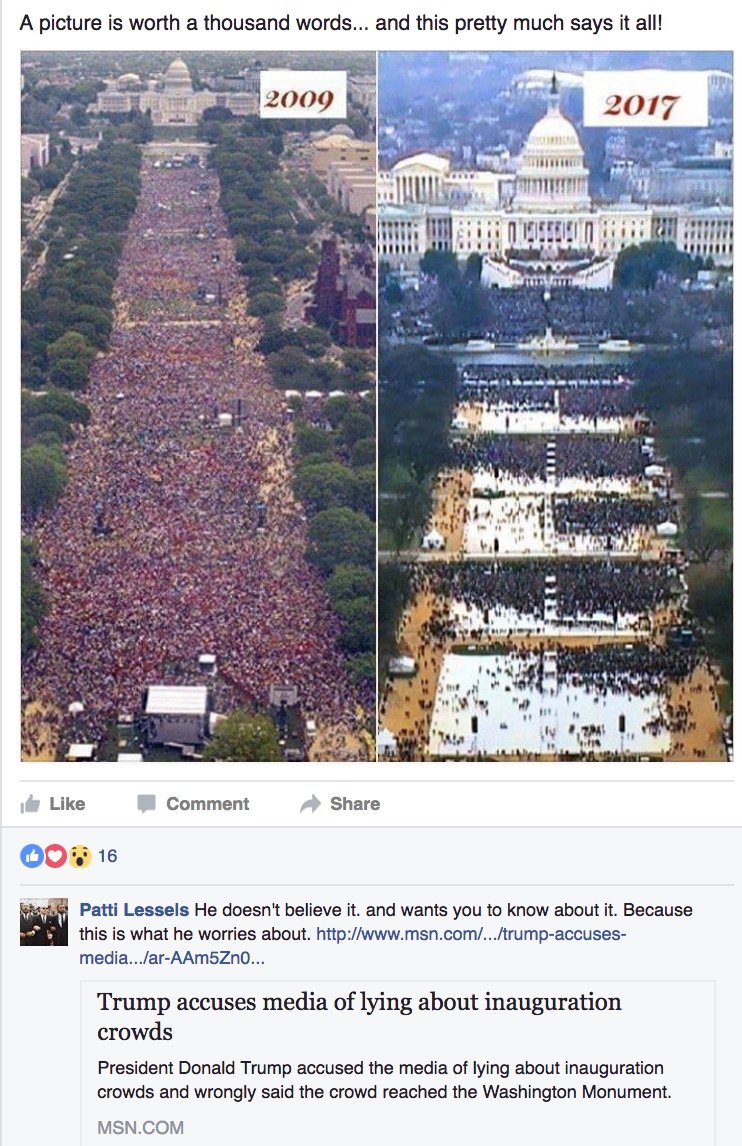I tried to avoid the Trump inauguration.
While driving to the post office, I turned on CBC Radio which happened to be livestreaming the speech and caught something about God favouring America over others before I could turn it off.
But that night, my husband remarked that there had not been many people attending the event in person. I filed that thought away until yesterday, when my friend Jennifer posted this on her Facebook page.
I saw it before the comment was added, and thought, “Wow, Jim was right. There was such a small crowd!”
And then the rebuttal from Trump (a performance worth your time if only to see the genius of playing to the crowd).
Then came the famous press conference. I actually began to wonder if someone had doctored the images.
But, thankfully, today multiple sources are reporting that the press conference, and Donald Trump’s speech to the CIA, were full of lies. Yes, on his first day in office. LIES. About insignificant things.
What strikes me, though, is how difficult and time-consuming it can be to actually track down the truth. Who is taking the time to do that?
I saw this posted earlier this morning, and I don’t know the source, but it’s an interesting read.
If that’s too much to read right now, here is a summary:
Because the source isn’t being revealed, there is a comparison of this post to Trump posts in the Twitter conversation.
What happens when legitimate sources are afraid to be revealed?
In any case, this is for consideration and not promoted as factual, so as a provocation, I share it with you.
And then the interview with Kellyanne Conway and even another word for lies: Alternative facts!
So what does this mean for Information Literacy instruction in our school system?
Will we still be telling children that government sites are sources of facts? For me, this is a catalyst for educators to think deeply about how we prepare children, and their families, for this world where all the rules around who and what you can trust are changing.
Digital literacies, information and web literacies in particular, are more important now than ever, according to Kalev Leetaru
But what does an effective Digital Literacies program look like in our schools?
In addition to reinforcing the notion that information literacy rubrics like RADCABB, and CRAPP, are insufficient, Rolin Moe takes a deeper look at why Information and Digital Literacies are not enough, and why how we teach them is insufficient. I agree with Audrey Watters‘ assessment that this is a must-read, especially for those charged with designing Digital Literacies programs in our school system.
Do our student understand how the monetization of modern journalism promotes entertainment over factual coverage?
In addition to skills, what knowledge about the web is needed to acquire effective web literacy skills?
How are we addressing the importance of Domain Literacy in schools?
And along with teaching Digital Literacies, how are we approaching the teaching of critical thinking?
Digital literacies are not the only missing piece in the current age of propaganda, but as educators, we can make it a priority to ensure this is something we are doing well for our kids.
All of the posts in this series can be found here:
3/10 – How the “smart phone” and mobile apps have changed the way we interact online
4/10 – Historical perspective – the co-created open web to corporately owned platforms
5/10 – Algorithms: What’s controlling what you see and read?
7/10 – Videos and Images – From Facts to Feelings
8/10 – Popularity over Importance: Celebrity culture in a time of wicked world problems
10/10 – Escape Your [Filter] Bubble
~~~~~~~~~~~~~~~
This post is part of a 10 day posting challenge issued by Tina Zita. You can’t be a connected educator if you don’t contribute. Sometimes we need a nudge to remember that if nobody shares, nobody learns. Thanks Tina!
~~~~~~~~~~~~~~
A caution about this post: I am a learner, not an expert.
I have set out here to use my #10posts10days (#10days10posts) challenge to explore this area that deeply interests me, in an open way that lets others see what I am learning. If you know more than I do, please correct me if necessary, and share! If you have more questions, please post those in the comments too. Let’s learn more together.
All of the posts in this series can be found here: You Live in a Bubble
Featured image by Jonathan Simcoe on Unsplash






Your 10 posts are identifying some of the most critical issues in digital learning, Donna. I particularly liked your historical retrospective on what’s happened to the Web since the opening of the free global “information highway.” Each of your posts contains useful links and resources. You are correct in highlighting the role of teachers in equipping students with the knowledge and skills to deconstruct “fake news.”